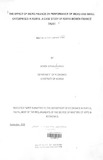| dc.description.abstract | The MSE sector, which has over the years demonstrated a remarkable capacity to grow even in
the midst of generalized economic decline in the rest of the economy, remains as one of the few
available options to the urban and rural poor. The growth capacity of the sector has made many
observers of the development options facing Kenya to strongly believe that, it is in this sector, more
than in any other that, the biggest strides towards the achievement of Kenya's goals for rapid
employment generation, poverty reduction and indeed industrialization can be made.
The government, donors, NGOs and the private sector have made remarkable progress in
ensuring increased accessibility of micro-finance services to the MSEs. Such support interventions
have their bases on development objectives i.e. poverty alleviation, employment creation and
economic recovery among others. These are the ultimate goals of the credit programs. This paper
explores the effect of micro-finance on the performance (profitability) of enterprises financed by
KWFT
The main objectives of the study are to identify the determinants of performance of MSEs and also
to determine the relative impact of credit and the identified determinants on performance of these
enterprises. To accomplish these objectives, data of KWFT clients drawn from. Nairobi and Mt
Kenya regions was used and analyzed using econometric methods.
The study found that credit and the number of.days an enterprise operates per week have a
positive and significant effect on performance. Business management practices, urban location,
age of an enterprise, education of an entrepreneur and job training have a positive but insignificant
effect on performance. The roadside site has a negative and significant effect on performance of
enterprises. Age of an entrepreneur and sole-ownership have a negative but insignificant effect on
performance.
Policies recommended include the increase of supply.o! micro-finance to match the demand and
the encouragement of micro-finance organizations to equip their clients with business management
skills. Measures must also be taken to provide' MSEs with suitable areas of operation devoid of
harassment. Lastly, initiatives need to be taken to increase accessibility of markets by MSEs. | en |

